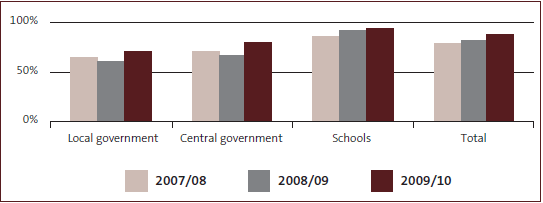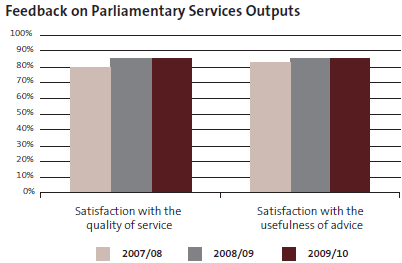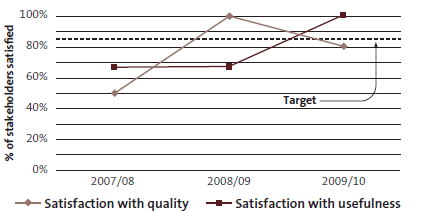Summary Annual Report 2009/10

I am pleased to present my first summary annual report as Auditor-General. Since starting my term, I have found a well-run Office carrying out its statutory role of completing financial audits and public reporting to Parliament. The staff of the Office and our wider community of contracted audit service providers can be proud of their efforts throughout the year, having achieved good results in the auditing and reporting of public sector performance.
Annual audit achievements
A significant achievement for which I wish to thank Audit New Zealand and my contracted audit service providers has been the improvement in audit reports issued on time. The improving trend reflects the collective efforts of all my auditors to better manage audit arrears.
We are also progressively working to play our part in ensuring that public sector reporting is meaningful and useful to readers, providing a basis for assessing the cost-effectiveness of public services. We have revised my standard for auditors in attesting to service performance information. Over the next three years, we will attest to the appropriateness of the information disclosed.
During 2009/10, we made our preparations for the huge exercise of amalgamating eight local authorities into one Auckland "super" council. Our immediate effort is focused on the audit of Auckland Council's unique Planning Document, due to be in place by November 2010. We are also focusing on the dissolution audits of entities that cease to exist after October 2010 as part of the Auckland reforms.
Internationally driven changes to auditing and accounting standards and the mobility of the audit workforce affect us, and there continues to be pressure on audit fees. I am committed to ensuring cost-effective audits, having regard to professional standards and my statutory mandate, and to transparency about audit fees. I have initiated a review of the model the Office uses to allocate audits, to ensure that its principles encourage these qualities and facilitate transparent reallocation of audits when warranted.
Reporting to Parliament achievements
Reporting on public sector performance through the presentation of performance audit, inquiry, and special study reports to Parliament is the unique role of this Office. It is important that our reports deal with matters of significance that can improve the public sector and/or provide assurance about public entities' performance, so I'm pleased that feedback confirms our reports are achieving this.
Our reports in 2009/10 covered such diverse topics as special education, aged care, ministerial expenses, forecast demand for drinking water, conflicts of interest, and civil aviation. The increasing demand for us to carry out inquiries has continued and, within this, there has been a significant growth in the number of major and sensitive inquiries.
Concluding comments
I extend my thanks to the Deputy Auditor-General, Phillippa Smith, who we were pleased to be able to congratulate on her reappointment in 2010 for a second term as Deputy-Auditor General. I also acknowledge my predecessor, Kevin Brady, and wish him all the best in his retirement.
The Office, as part of the public sector, faces a challenging year in which the wider economic environment means that we must focus on being even more effective and insightful about the opportunities for improvement in the public sector.
I expect the Office to be in touch with the realities of the world, to provide answers and insights, and to be flexible when needed. We will look to adapt to issue results when matters are current in a form suiting the audience, so our work has the best chance of positive influence.
I would like to thank the staff of the Office and our community of contracted audit service providers. With their support, I look forward to the challenges and opportunities of 2010/11.

Lyn Provost
Controller and Auditor-General
30 September 2010
Our role and structure
The Controller and Auditor-General (Auditor-General) is an Officer of Parliament. The Auditor-General is independent of executive government and Parliament in discharging the functions of the statutory office, but is answerable to Parliament for the stewardship of the public resources used to carry out those functions.
The Auditor-General's staff are organised in two business units, supported by a shared corporate services team:
- The Office of the Auditor-General plans, sets policy and standards, appoints and oversees the work of auditors, carries out performance audits, inquiries, and special studies, and provides reports and advice to Parliament and others.
- Audit New Zealand carries out annual audits allocated by the Auditor-General and provides other assurance services to public entities.
The Auditor-General also engages private sector accounting firms to carry out annual audits of some public entities. Most audits of public entities are allocated by the Auditor-General. A contestable process is used to appoint the auditors of strongly commercial entities and a small number of schools.

Overview of achievements
We want to help create trust in the effectiveness and efficiency of the public sector through our independent advice and assurance. For our measure of trust – New Zealand's ranking in the Transparency International Corruption Perception Index – New Zealand ranked first in 2009. The State Services Commission's Integrity and Conduct and the Kiwis Count Surveys also showed maintained or improved results on the prior survey results in areas of interest to us - probity, performance, accountability, waste and authority.
Annual audits
Our annual audit and other assurance work show that the quality of financial reporting and management in the public sector is being maintained.
The percentage of audit reports being issued on time improved to 88% (compared to 82% in 2008/09 and 79% in 2007/08). The percentage of audit reports being qualified (2.8%) was also similar to previous years. We think the improving trend in the number of audit reports being issued on time reflects the settling in of New Zealand equivalents to International Financial Reporting Standards and our collective efforts to better manage audit arrears.
Audits completed on time 2007/08 to 2009/10

Our assessments of central government entities' management control environment and financial information systems and control showed slight improvement against the previous year, with small reductions in "Good" and "Needs Improvement" grades. Last year's acceptance of Audit New Zealand's recommendations in annual audit management reports to public entities of 79% was also maintained.
We achieved a significant reduction in the level of audit arrears compared with the prior year's position. We are also seeing a slow decline in the arrears that are due to our inaction, and expect this trend to continue as we continue to reduce the overall level of arrears.
| Audits due 2009/10 |
Arrears at 0/6/10 |
% Arrears at 30/6/10 |
Arrears at 30/6/09 |
Arrears at 30/6/08 |
|
|---|---|---|---|---|---|
| Central government | 733 | 95 | 13% | 123 | 89 |
| Local government | 688 | 154 | 22% | 209 | 184 |
| Schools | 2519 | 64 | 3% | 97 | 180 |
| Totals | 3940 | 313 | 8% | 429 | 453 |
Reflecting the economic environment, changes in audit costs due to charge-out rates were largely held in 2009/10. The annual independent review of our processes confirmed the probity and objectivity of the methods and systems we use to allocate and tender audits and monitor the reasonableness of audit fees.
Audit fee revenue and other income was higher than forecast, due to our higher completion of audit arrears, and increases to fee and overhead contribution revenue being higher than budgeted due to changes in audit hours.
Reporting to Parliament
Our results for Supporting accountability to Parliament and Performance audits and inquiries also show we are achieving our desired effect.
The results of the stakeholder feedback interviews show the Office continuing to play an important part in supporting accountability to Parliament, while increasing the advisory reporting we provide to Parliament.

We surveyed select committee members, who told us our advice assists them in their Estimates examinations and financial reviews. All the select committee members surveyed agreed that the Office's work helps build and maintain public trust in the effectiveness and efficiency of the public sector. Ratings by select committee members for the quality and usefulness of advice remained at 86%, with all members surveyed agreeing that the Office was proactive in alerting their committee to significant issues. 90% of our stakeholders agreed that our staff have an excellent understanding of their sectors.
Our reports, advice, and responses to inquiries are subject to a range of quality assurance reviews to ensure that they are well prepared. In all cases, quality assurance confirmed that work was of good quality.
The 22 reports we published are made up of reports to Parliament on the results of annual audits (2), on inquiries (7), and on performance audits and other special studies (13). Copies of the reports are available on our website.
We followed up on recommendations we made in our reports on performance audits and inquiries, to understand and confirm that public entities had taken action in response to those recommendations.
Stakeholders’ satisfaction with the quality and usefulness of our reports 2007/08 to 2009/10

Our performance audit indicators show we maintained the number produced as well as the quality of reports and the underlying methodology for their preparation. We received improved stakeholder ratings compared with the previous two years for the usefulness of our performance audits, while ratings for the quality of our performance audit reports dropped to 80% in 2009/10 from 100% the year before, falling just below our target of 85%.
The trend of increasing numbers of inquiries and, within this, the complexity and profile of inquiries continued, so we were pleased to have maintained the flow of routine inquiry work.
In 2009/10, our revenue was higher than forecast, as we sought revenue for complex and major inquiries requested by entities about their decision-making and management practices. Overall, our total expenditure was lower than budgeted, partly due to timing of some expenditure and reprioritisation of our performance audits. We also made business improvement savings in administrative costs.
We conclude that the Office has generally achieved its performance intentions, and that our work has had a positive impact for the public sector.
Snapshot of achievements
(summary Statement of service performance)
Audit and assurance services
| 2009/10 Forecast | 2009/10 Actual | 2008/09 Actual | 2007/08 Actual |
|---|---|---|---|
| Less than 10% of audits in arrears are due to inaction on our part | 42% – 47%* | 49% | 55% |
| All management reports sent within six weeks of the audit report | 95% | 93% | 93% |
| No outstanding LTCCP opinions at 30 June 2009 are due to inaction on our part | N/A | 8% outstanding at 30 June, none due to inaction on our part. | N/A |
| All LTCCP management reports are issued within six weeks of issuing the LTCCP opinion | N/A | 85% | N/A |
| 75% of client survey respondents rate Audit New Zealand's overall service as 7 or greater on a scale of 1 to 10 | 83% | 80% | 75% |
| 95% of auditors receive satisfactory or better grading through quality assurance reviews | 98% | 100% | 93% |
| Independent review confirms the probity and objectivity of our methods for allocating audits and monitoring fees | Confirmed | Confirmed | Confirmed |
| Costs (2009/10 forecast – $63.1m) | $62.7m | $60.6m | $58.6m |
*Note: This year we used an estimate.
Supporting accountability to Parliament, and Performance audits and inquiries
| 2009/10 forecast | 2009/10 Actual | 2008/09 Actual | 2007/08 Actual |
|---|---|---|---|
| At least 85% of select committee members we seek feedback from rate the advice they receive from us as 4 or better on a scale of 1 to 5 for quality and usefulness | Quality: 86% Usefulness: 86% |
Quality: 86% Usefulness: 86% |
Quality: 80% Usefulness: 83% |
| At least 85% of stakeholders we seek feedback from rate our performance audit reports as 4 or better on a scale of 1 to 5 for quality and usefulness | Quality 80% Usefulness 100% |
Quality: 100% Usefulness: 67% |
Quality: 50% Usefulness: 66% |
| Number of reports issued on performance audits, inquiries, special studies, and results of annual audits | 22 | 21 | 24 |
| Independent reviews of two performance audits confirm their quality | Confirmed | Confirmed | Confirmed |
| 80% of findings on inquiries are reported within: | |||
| 3 months for routine inquiries; | 86% | 84% | 91% |
| 6 months for sensitive inquiries; and | 94% | 73% | 82% |
| 1 year for major inquiries. | 80% | 0% (2 major inquiries reported within 13 months) | None undertaken |
| Costs (2009/10 forecast $9.7m) | $9.0 | $9.3m | $9.2m |
Financial performance and financial position*
| 2010 | 2010 | 2009 | 2008 | |
|---|---|---|---|---|
| Actual | Supp. Estimates | Actual | Actual | |
| $000 | $000 | $000 | $000 | |
| The income we earned was: | 73,798 | 72,814 | 70,420 | 68,146 |
|
||||
|
||||
| Our total expenditure was: | 71,784 | 72,796 | 69,934 | 67,861 |
| The main items we spent money on were personnel costs $34.0m, fees paid to contracted auditors $26.3m, and other day-to-day operating costs $11.4m All our spending was within the limits set by Parliamentary appropriations |
||||
| Our surplus for the year, which is returned to the Crown, was: | 2,014 | 18 | 486 | 285 |
| Our total assets at 30 June were: | 14,281 | 12,345 | 13,267 | 11,961 |
|
12,000 | 10,046 | 10,916 | 10,114 |
|
2,281 | 2,299 | 2,351 | 1,847 |
| Our liabilities at 30 June were: | 10,760 | 8,824 | 9,746 | 8,440 |
|
10,196 | 8,304 | 9,229 | 7,790 |
|
564 | 520 | 517 | 650 |
| Movements in our taxpayers' funds were: | ||||
| Opening balance at 1 July | 3,521 | 3,521 | 3,521 | 3,521 |
| Surplus for the year | 2,014 | 18 | 486 | 285 |
| Provision for payment of surplus to the Crown | (2,014) | (18) | (486) | (285) |
| Closing balance at 30 June | 3,521 | 3,521 | 3,521 | 3,521 |
| Our net increase/(decrease) in cash held was: | 514 | (930) | 520 | (669) |
|
1,801 | 642 | 2,233 | 452 |
|
(801) | (1,086) | (1,428) | (652) |
|
(486) | (486) | (285) | (469) |
* This summary has been extracted from the full financial statements. The full financial statements, dated 30 September 2010, are in our Annual Report 2009/10 (available on our website, www.oag.govt.nz).
Audit report
 |
|---|
| AUDIT REPORT TO THE READERS OF THE CONTROLLER AND AUDITOR-GENERAL'S SUMMARY FINANCIAL STATEMENTS AND STATEMENTS OF SERVICE PERFORMANCE FOR THE YEAR ENDED 30 JUNE 2010 The accompanying summary statement of financial position as at 30 June 2010, the summary statement of comprehensive income, summary statement of changes in taxpayers’ funds (equity) and summary statement of cash flows and statement of service performance for the year then ended are derived from the audited financial statements and statement of service performance of the Controller and Auditor-General for the year ended 30 June 2010. We expressed an unmodified audit opinion on those financial statements and statement of service performance in our report dated 30 September 2010. The summary financial statements and statement of service performance do not contain all the disclosures required for full financial statements and statement of service performance under generally accepted accounting practice in New Zealand. Reading the summary financial statements and statement of service performance, therefore, is not a substitute for reading the audited financial statements and statement of service performance of the Controller and Auditor-General. Unmodified Opinion In our opinion, the summary financial statements and statement of service performance derived from the audited financial statements and statement of service performance of the Controller and Auditor-General for the year ended 30 June 2010 are a fair summary of those financial statements, in accordance with FRS-43: Summary Financial Statements. Responsibilities of the Controller and Auditor-General and the Auditor The Controller and Auditor-General is responsible for preparing the summary financial statements and statement of service performance in accordance with FRS-43: Summary Financial Statements. Our responsibility is to express an opinion on the summary financial statements and statement of service performance based on our procedures, which were conducted in accordance with International Standard on Auditing (New Zealand) (ISA (NZ)) 810, Engagements to Report on Summary Financial Statements. We carry out audit assignments on behalf of the Controller and Auditor-General. The level of work from these assignments is no greater than the level of work prior to our appointment as auditor. Other than the audit and these assignments, we have no relationship with or interests in the Controller and Auditor-General.  CST Nexia Audit Chartered Accountants Manukau City, New Zealand 30 September 2010 Matters Relating to the Electronic Presentation of the Audited Summary Financial Statements and Statement of Service Performance This audit report relates to the summary financial statements and statement of service performance of the Controller and Auditor-General for the year ended 30 June 2010 included on the Controller and Auditor-General’s website. The Auditor-General is responsible for the maintenance and integrity of the Controller and Auditor-General’s website. We have not been engaged to report on the integrity of the Controller and Auditor-General’s website. We accept no responsibility for any changes that may have occurred to the summary financial statements and statement of service performance since they were initially presented on the website. The audit report refers only to the summary financial statements and statement of service performance named above. It does not provide an opinion on any other information which may have been hyperlinked to or from the summary financial statements and statement of service performance. If readers of this report are concerned with the inherent risks arising from electronic data communication, they should refer to the published hard copy of the audited summary financial statements and statement of service performance and related audit report dated 30 September 2010 to confirm the information included in the summary audited financial statements and statement of service performance presented on this website. Legislation in New Zealand governing the preparation and dissemination of financial information may differ from legislation in other jurisdictions. |
